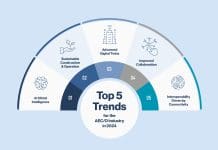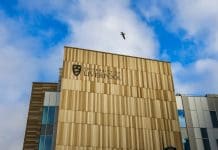Professor David Wagg explains the role of the Alan Turing Institute’s new Turing Research & Innovation Cluster in Digital Twins
The Alan Turing Institute is the United Kingdom’s national institute for data science and artificial intelligence. As part of the newly launched Institute Strategy, a Turing Research & Innovation Cluster in Digital Twins (TRIC-DT) has been formed.
The TRIC-DT mission is to carry out fundamental research relating to digital twins that addresses the most urgent challenges facing society and achieves real-world impact.
Background to digital twins
It has long been predicted that creating “virtual duplicates” of the world around us will be possible in the future. Such virtual duplicates are what we now call digital twins, and early versions are now being built based on significant recent advances in digital technologies, data science and artificial intelligence.
Digital twins offer exciting new possibilities across a wide range of sectors from health, the environment and transport to manufacturing, defence and infrastructure.
By connecting the virtual and physical worlds, digital twins can better support decisions, extend the operational life of systems and services, explore different scenarios, and introduce many other efficiencies and benefits.
It is likely that digital twins will play a crucial role in delivering solutions to the global-scale challenges, such as climate change, which currently face humanity.
While early twins have proven to be extremely powerful in a range of areas, they often have limitations, such as requiring specialised expertise and computational infrastructure, which can create a barrier that limits their scalable use. The urgency of the global-scale challenges means that research and development is needed in key thematic areas.
Context of the Alan Turing Institute’s research on digital twins
Since its inception in 2015, The Alan Turing institute has invested more than £26m in digital twin research and innovation across a wide portfolio of projects, including developing foundational theory and applications in the engineering, environmental and social sciences.
The TRIC-DT is a new mechanism that will work with existing research teams, in Turing to deliver three interlinked objectives:
- Advance the science and implementation of digital twinning and use these advances to address important technological and societal challenges.
- Produce open and reproducible computational tools for digital twin design, development, and deployment.
- Build a multidisciplinary community of practice in digital twinning that democratises access to digital twin technology.
The TRIC-DT was launched at the AIUK event in March 2023 and has now moved into an operational phase to deliver its objectives.
Thematic research topics
The TRIC-DT has three complementary research themes:
- Natural environment: Enabling the mitigation of environmental change to support resilience.
- Infrastructure: Enhancing the efficiency and resilience of critical infrastructure.
- Health: Improving human health and wellbeing.
The natural environment theme aims to develop cutting-edge digital twin technology to exploit environmental data, monitoring and modelling expertise. Current topics under investigation include the effect of climate change on Artic and Antarctic ice sheets and combined environmental and meteorological digital twins.
Examples of projects in the infrastructure domain include work on building a digital twin for a Hawk T1A aircraft, and traffic forecasting applications.
The overarching aim of the infrastructure theme is to develop underpinning technologies to design, validate and implement digital twins for critical infrastructure. The current projects will ultimately be developed into working prototypes that can be tested using real-world data and settings.
The health theme’s aim is to develop state-of-the-art tools that enable the creation of robust and rapid digital twins at scale. Currently, the main focus is on creating an anatomical and functional cardiac digital twin.
The idea is that such a digital twin can be used in a range of medical scenarios. For example, to ultimately provide a patient-specific clinical service that monitors and predicts patient outcomes following cardiac diagnosis and therapy.
The activities of the TRIC-DT are supported and accelerated by an Innovation & Impact Hub.
The role of the hub is to support the development of open and reproducible tools, driving impact with diverse stakeholders, building and supporting multidisciplinary communities of practice, and embedding best practices for responsible research and innovation throughout the TRIC-DT.
The unique aspect of the Alan Turing Institute is the focus on data science and artificial intelligence. As a result, all three themes in the TRIC-DT are making extensive use of cutting-edge innovation in these technologies. Current projects include the use of methods such as reinforcement learning, Bayesian statistical modelling, emulators, knowledge graphs and large language models.
In the future, the TRIC-DT team will be looking at cross-thematic research topics. For example, there are multiple ways that the natural environment overlaps with infrastructure. In terms of methodologies, there is scope to apply novel methods across all themes and it is anticipated that this will be the case with the techniques mentioned above, like reinforcement learning.
The TRIC-DT is in its early stages of operation and looks forward to building its activities over the next few years. Its primary focus is the use of data science and AI within digital twins in order to achieve the objectives described above.
The TRIC-DT is also helping to lead other related activities in the UK research landscape. For example, the Alan Turing Institute was also recently awarded funding by UKRI to lead a UK-wide digital twinning research network, which is due to start its activities in 2024.
This is led by David Wagg and further details, along with contact information for those who might want to get in touch, are given below.
Prof David Wagg

Tel: +44 (0)20 3862 3352

















